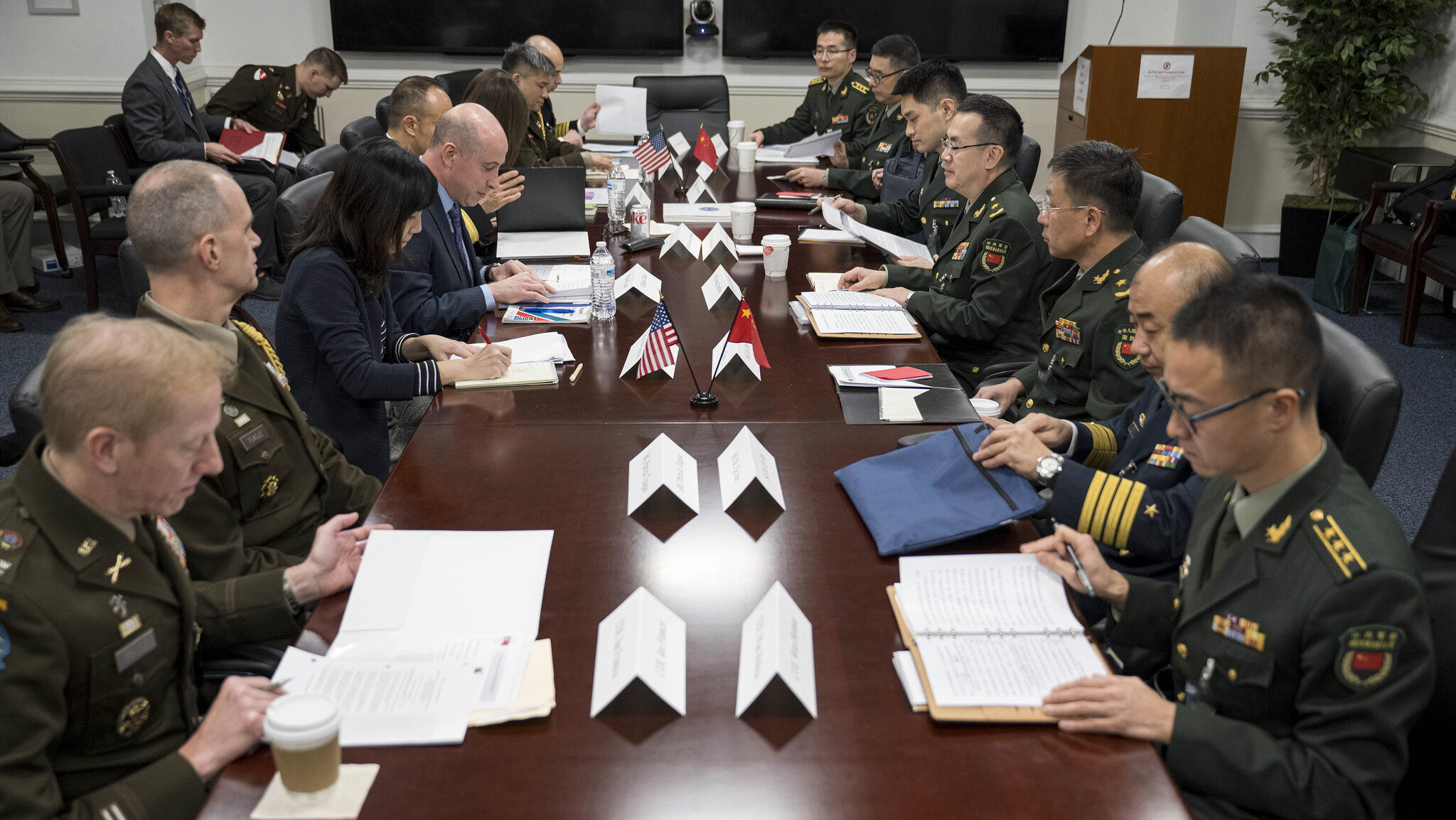
Deputy Assistant Secretary of Defense for China, Taiwan and Mongolia Michael S. Chase hosts delegates from the People’s Republic of China for the annual U.S.-PRC Defense Policy Coordination Talks at the Pentagon, Washington, D.C., Jan. 9, 2024. (DoD photo by U.S. Navy Petty Officer 1st Class Alexander Kubitza)
WASHINGTON — American and Chinese military officials met face to face in Washington this week to address the “full range” of policy concerns between the two superpowers, resuming an annual summit that Beijing canceled in 2022, according to a senior American defense official and a Pentagon description of the meeting.
The Defense Policy Coordination Talks (DPCT), which started Monday and concluded today at the Pentagon, are traditionally held on a rotating basis between Washington and Beijing. The Chinese canceled last year’s meeting as part of a wide-ranging freeze on all military communications with their American counterparts, making the DPCT’s resumption today an “important step” in reestablishing communications, the official told reporters ahead of the meeting.
Typically, the meeting initially focuses on nailing down details for upcoming planned exchanges and subsequently addresses substantive policy concerns, the official said. This time the US team was led by Deputy Assistant Secretary of Defense for China, Taiwan and Mongolia Michael Chase; the Chinese delegation was headed by Maj. Gen. Song Yanchao, deputy director of the Central Military Commission Office for International Military Cooperation.
“The two sides discussed U.S.-PRC [People’s Republic of China] defense relations, and Dr. Chase highlighted the importance of maintaining open lines of military-to-military communication in order to prevent competition from veering into conflict,” a Pentagon readout of the event said. “He also discussed the importance of operational safety across the Indo-Pacific region; reaffirmed that the United States will continue to fly, sail, and operate safely and responsibly wherever international law allows; and underscored that the U.S. commitment to our allies in the Indo-Pacific and globally remains ironclad.”
The DoD said Chase raised the “repeated PRC harassment” of Philippine vessels in the South China Sea, and “reiterated that the United States remains committed to our longstanding one China policy” when it comes to tensions over Taiwan.
After US President Joe Biden and Chinese President Xi Jinping met in California in November, the two pledged to resume military-to-military communications, specifically including the DPCT as well as other talks under the Military Maritime Consultative Agreement. In the time since the summit between the two heads of state, Chairman of the Joint Chiefs of Staff Air Force Gen. CQ Brown held a virtual discussion with his Chinese counterpart Gen. Liu Zhenli in December, formally ending the communications standoff.
The prior refusal of Chinese officials to speak with their American counterparts — prompted by House Speaker Nancy Pelosi’s visit to Taiwan in August 2022 — sparked concerns in Washington about miscalculations, especially as Pentagon officials have accused Chinese forces of conducting dangerous intercepts of American aircraft and of acting more aggressively in the contested South China Sea.
In June, US Defense Secretary Lloyd Austin said, “You know, I am deeply concerned that the PRC has been unwilling to engage more seriously on better mechanisms for crisis management between our two militaries. But I hope that will change, and soon.”
Beyond the potential for small incidents to spiral out of control, officials have emphasized keeping communications open is also critical in light of China’s long-stated ambition to reunify the country with the island nation of Taiwan, which Beijing considers a rogue province. Biden has made clear the US would defend Taiwan if China decides to invade, spurring a range of modernization initiatives across DoD to keep pace with what officials call the “pacing threat” posed by the People’s Liberation Army.
However, the senior official downplayed recent comments from Xi about China reclaiming Taiwan, emphasizing that conflict is not “imminent or inevitable,” but requires the willingness to talk.
“The bottom line is that we’re going to keep working to open these lines of communication because they’re important for preventing competition from veering into conflict,” the official said.








